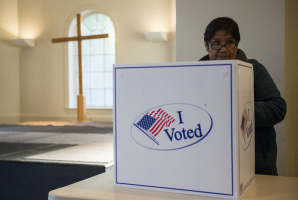Sharia Inspired Laws Spreading across Indonesia
Sharia-based laws have been passed in more than half of Indonesia's provinces with support for such Islamic laws expected to grow as the country heads towards its presidential election in July.
More than 50 regencies in 16 of the 32 provinces in Indonesia have passed laws linked to sharia, or Islamic religious law, according to persecution watchdog group Compass Direct News. A regency in Indonesia is one step lower in terms of administrative division than the provincial government.
These sharia inspired laws vary vastly across the regencies and include requiring both Muslim and non-Muslim women to wear headscarves; arresting and then charging women found "loitering" alone on the street after 10 p.m. with prostitution; providing conditions for Quran literacy among schoolchildren; as well as severe punishment for adultery, alcoholism and gambling.
In Padang - the capital and largest city of West Sumatra, Indonesia – all schoolgirls, including non-Muslims, are required to wear a headscarf.
"This is unacceptable because it is not in line with the pluralism that the constitution recognizes," said Syafi'I Anwar, executive director of the International Center for Islam and Pluralism, according to the International Herald Tribune.
Indonesia, home to the world's largest Muslim population, is a democracy that promises religious freedom to its citizens. For the most part, non-Muslims can worship freely in Indonesia and live peacefully amongst Muslims.
Even the city of Aceh, located on the northwestern island of Sumatra, has churches despite being the only province completely governed by Sharia laws.
But groups such as the Committee for the Implementation and Maintenance of Islamic Law (KPPSI) are encouraging its members to vote for politicians who share their goal of passing sharia-inspired laws.
Although there have been protests against the sharia-based laws, the Home Affairs Minister had stated last February that the government saw no need to nullify the some 600 sharia-based laws passed by local governments.
Critics of the laws say if Indonesia allows sharia-based laws then other areas with a large population of other religions can pass Hindu or Christian laws.
With the next presidential election months away, political analysts predict President Susilo Bambang Yudhoyono to partner with several Islamic parties, according to Compass Direct.
Analysts say the only way Yudhoyono can gain a majority vote is by forming a coalition with most if not all of the Indonesia's Islamic party.




























